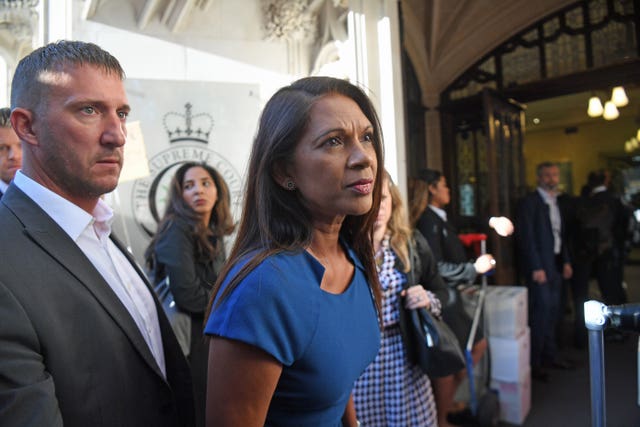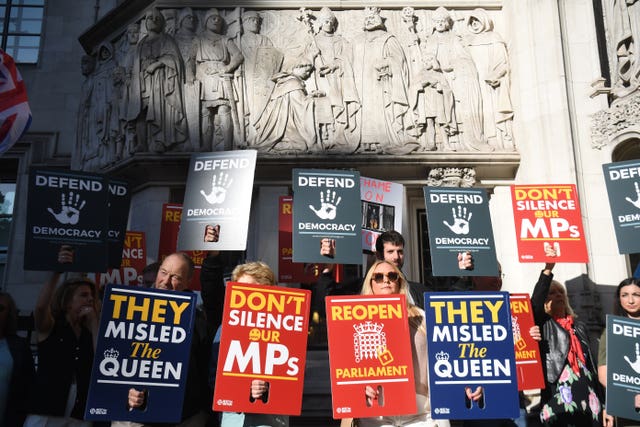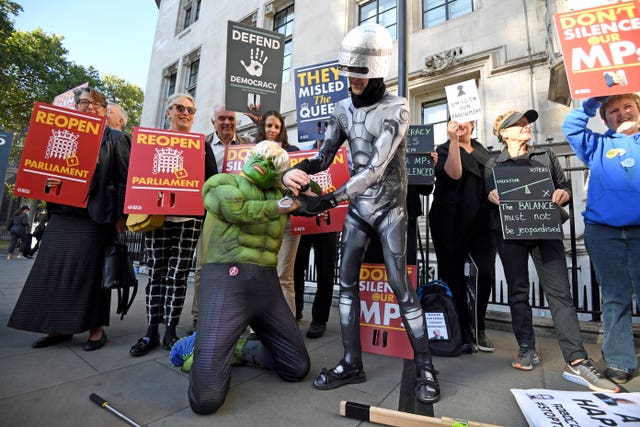
The UK’s highest court has been urged to find that Boris Johnson’s advice to the Queen to suspend Parliament was “of no legal effect”.
Eleven Supreme Court justices were asked at the start of an historic hearing on Tuesday to declare that the Prime Minister’s decision to prorogue Parliament for five weeks was unlawful.
The judges are to hear argument over three days arising out of two separate challenges brought in England and Scotland over the legality of the prorogation – the cases resulted in two different outcomes.
A crowd of about 40 protesters, holding signs saying “Defend democracy”, “Reopen Parliament” and “They misled the Queen”, gathered outside the court ahead of the hearing.
READ MORE: Supreme Court to hear appeals over Boris Johnson’s suspension of Parliament
Mr Johnson says the five-week suspension is to allow the Government to set out a new legislative agenda in a Queen’s Speech when MPs return to Parliament on October 14.
But those who brought legal challenges against the Prime Minister’s decision argue the prorogation is designed to prevent parliamentary scrutiny of the UK’s impending exit from the EU on October 31.
At the outset of the hearing, Supreme Court President Lady Hale emphasised that the case is only about whether the Prime Minister’s advice to the Queen was lawful.
 Gina Miller arrives at court (Kirsty O’Connor/PA)
Gina Miller arrives at court (Kirsty O’Connor/PA)
The High Court in London dismissed the case brought by businesswoman and campaigner Gina Miller – who previously brought a successful legal challenge against the Government over the triggering of the Article 50 process to start the Brexit countdown – finding that the length of the prorogation was “purely political”.
READ MORE: Petition launched to require two-thirds majority for independence
Lord Pannick QC, for Mrs Miller, told the Supreme Court that the appeal raises “fundamental questions of constitutional law”.
He argued that the High Court “erred in law” in its conclusions in the case brought by Mrs Miller, which was supported by former prime minister Sir John Major, shadow attorney general Baroness Chakrabarti and the Welsh and Scottish governments.
Lord Pannick, in written argument before the court, submitted that the lower court “erred in law by failing to find that the advice of the Prime Minister was an unlawful abuse of power in the circumstances of this case”.
 Protesters outside the Supreme Court (Kirsty O’Connor/PA)
Protesters outside the Supreme Court (Kirsty O’Connor/PA)
He argues that Mr Johnson’s advice over a five-week suspension was an unlawful abuse of power – pointing out that there has been no prorogation for longer than three weeks in the past 40 years.
He stated in his written argument: “The Prime Minister’s reasons for advising on a five-week prorogation were improper in that they were infected with factors inconsistent with the concept of Parliamentary sovereignty, in particular his belief that Parliament does nothing of value at this time of year and his concern that Parliament might take steps which would undermine the Government’s negotiating position with the EU.”
He told the justices: “It is a remarkable feature of these proceedings that the Prime Minister has not made a witness statement explaining why he decided to advise Her Majesty to prorogue Parliament for a period as long as five weeks, and there is no evidence from the Cabinet Secretary or any other official explaining that matter.”
A cross-party group of around 75 MPs and peers, led by SNP MP Joanna Cherry QC, was responsible for the Scottish challenge and the Supreme Court appeal against the Court of Session’s decision is being brought by the Advocate General for Scotland, on behalf of the Westminster Government.
 Protesters dressed as the Incredible Hulk and Robocop outside the Supreme Court (Kirsty O’Connor/PA)
Protesters dressed as the Incredible Hulk and Robocop outside the Supreme Court (Kirsty O’Connor/PA)
The Supreme Court justices are being asked to determine in both appeals whether the Prime Minister’s advice to the Queen is “justiciable” – capable of challenge in the courts – and, if so, whether it was lawful.
In the Scottish case, they are also being asked to consider whether the appeal is “academic”, given Parliamentary sittings before the UK’s proposed exit from the EU on October 31.
Mr Johnson advised the Queen on August 28 to prorogue Parliament for five weeks from the week of September 9.
The court will hear submissions from the parties and interveners from Tuesday to Thursday, but it is not clear when they will give a ruling.



Why are you making commenting on The Herald only available to subscribers?
It should have been a safe space for informed debate, somewhere for readers to discuss issues around the biggest stories of the day, but all too often the below the line comments on most websites have become bogged down by off-topic discussions and abuse.
heraldscotland.com is tackling this problem by allowing only subscribers to comment.
We are doing this to improve the experience for our loyal readers and we believe it will reduce the ability of trolls and troublemakers, who occasionally find their way onto our site, to abuse our journalists and readers. We also hope it will help the comments section fulfil its promise as a part of Scotland's conversation with itself.
We are lucky at The Herald. We are read by an informed, educated readership who can add their knowledge and insights to our stories.
That is invaluable.
We are making the subscriber-only change to support our valued readers, who tell us they don't want the site cluttered up with irrelevant comments, untruths and abuse.
In the past, the journalist’s job was to collect and distribute information to the audience. Technology means that readers can shape a discussion. We look forward to hearing from you on heraldscotland.com
Comments & Moderation
Readers’ comments: You are personally liable for the content of any comments you upload to this website, so please act responsibly. We do not pre-moderate or monitor readers’ comments appearing on our websites, but we do post-moderate in response to complaints we receive or otherwise when a potential problem comes to our attention. You can make a complaint by using the ‘report this post’ link . We may then apply our discretion under the user terms to amend or delete comments.
Post moderation is undertaken full-time 9am-6pm on weekdays, and on a part-time basis outwith those hours.
Read the rules hereLast Updated:
Report this comment Cancel